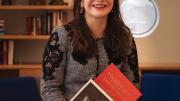Shawon Kinew is interested in how early modern sculptors pushed the boundaries of what sculpture should be able to do. “Even though they’re carving in hard marble,” explains the assistant professor of the history of art and architecture, “they’re making it look like fur or flesh that’s so soft that it looks like you could poke it and it would spring back….It’s been created to make you stop in your tracks and go, ‘Wow, meraviglia, it’s marvelous.’” Kinew remembers a similar feeling from her days as a child ballet dancer: That was “the first aesthetic experience I had where I was just completely enraptured by what I was seeing.” As a child, she split her time between Winnipeg and her home community, an Anishinaabe reserve in northwestern Ontario. Her father, an “intellectual force,” participated in dialogues between academic scientists and Native American knowledge keepers on physics and cosmology. “That was the milieu that I grew up in,” Kinew says; it helped lay the foundation for her curiosity about ideas and the human experience. In college at the University of Toronto, she was immediately captivated by art history. “The best course I took was a six-person class on Caravaggio where we didn’t read any secondary literature—only biographies from the seventeenth century.” After a Ph.D. from Harvard and postdoc at Stanford, she returned to Cambridge in 2018, in art history and as Shutzer assistant professor at the Radcliffe Institute. In her course “Old Masters in a ‘New’ World,” Kinew challenges students to think about how canonical European artists fit into the new landscape of art history. “Michelangelo has a lot to teach us about gender and sexuality,” she says. “Titian and Van Dyck have a lot to say about race and colonization. We just weren’t asking the right questions before."
Harvard Portrait: Shawon Kinew
Harvard Portrait: Shawon Kinew
Connecting European Old Masters with the new landscape of art history

Shawon Kinew
Photograph by Stu Rosner
You might also like
Mount Vernon, Historic Preservation, and American Politics
Anne Neal Petri promotes George Washington and historic literacy.
Harvard Professor Michael Sandel Wins Philosophy’s Berggruen Prize
The creator of the popular ‘Justice’ course receives a $1 million award.
Power is Knowledge
Who gets to make universal art?
Most popular
Explore More From Current Issue

The True Cost of Grade Inflation at Harvard
How an abundance of A’s created “the most stressed-out world of all.”







